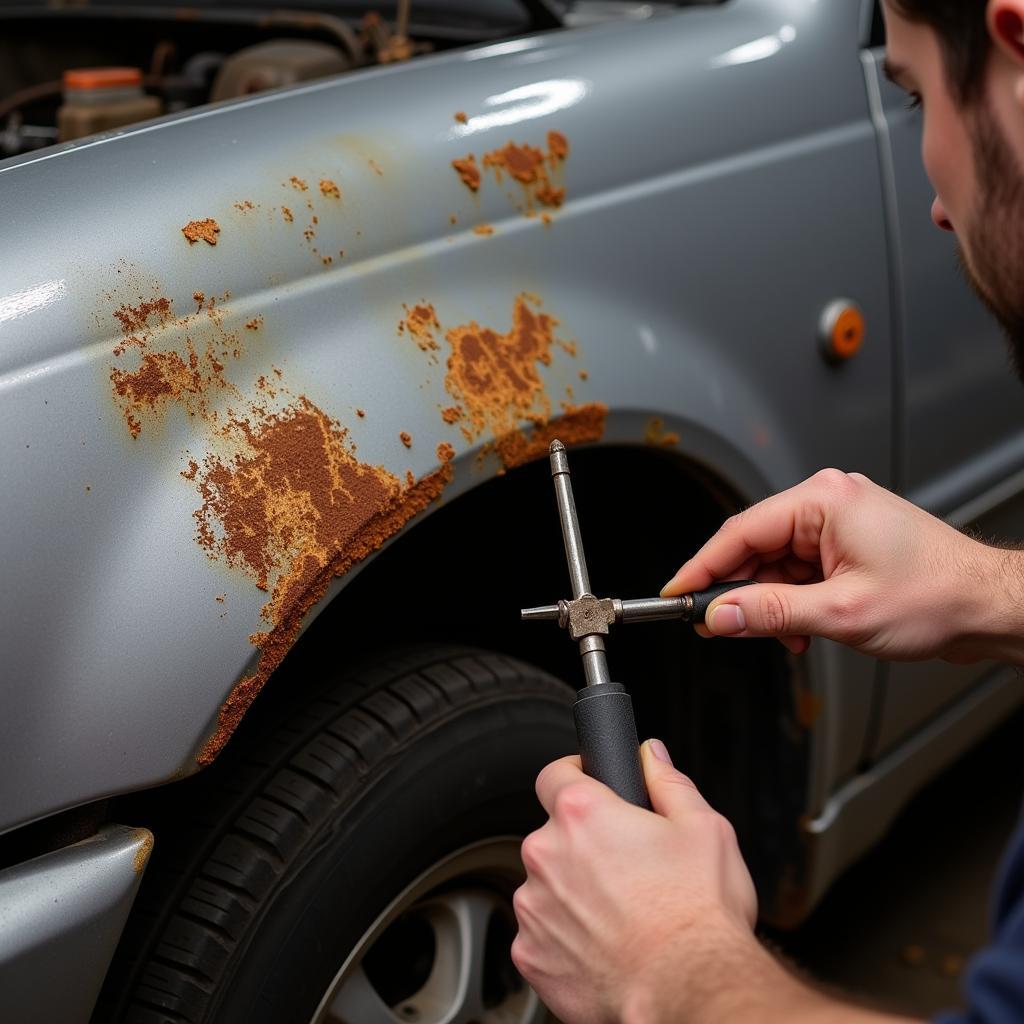Paint smudges can be a frustrating problem for car owners, especially if they’re trying to achieve a flawless finish. Whether you’re a DIY enthusiast or a professional detailer, knowing how to tackle these imperfections is essential. This comprehensive guide will walk you through the process of fixing car paint smudges, from understanding the causes to applying effective solutions.
What Causes Paint Smudges?
Paint smudges can occur for various reasons, but the most common culprits include:
- Improper Cleaning Techniques: Using harsh chemicals or abrasive cleaning materials can damage the clear coat and lead to smudges.
- Contamination During Application: Dust, dirt, or debris can get trapped in the wet paint during application, creating uneven surfaces and unsightly smudges.
- Improper Drying: If the paint dries too quickly or unevenly, smudges can form as the surface hardens.
- Overspray: Accidental spray from nearby surfaces can deposit paint onto the newly applied area, causing smudges.
Identifying Paint Smudges
Before attempting any repairs, it’s crucial to correctly identify the type of smudge you’re dealing with. This will help you choose the most appropriate solution:
- Surface Smudges: These are typically caused by dust or debris that has settled on the wet paint. They are usually easy to remove with a gentle cleaning.
- Deep Smudges: These are more serious and often result from improper paint application or overspray. They may require sanding and polishing to remove completely.
How to Fix Car Paint Smudges
1. Cleaning Surface Smudges
For surface smudges:
- Prepare your workspace: Ensure the area is clean and dust-free.
- Use a soft microfiber cloth: Avoid abrasive materials that can scratch the paint.
- Use a mild cleaner: Choose a car wash soap or paint cleaner specifically designed for car surfaces.
- Gently clean the smudged area: Work in circular motions, using light pressure.
- Rinse thoroughly with clean water: Remove any cleaning solution residue.
- Dry the surface with a clean microfiber cloth: This will prevent water spots.
2. Removing Deep Smudges
For deep smudges:
- Assess the severity: If the smudge is deeply embedded in the paint, you may need to use sanding and polishing techniques.
- Start with fine-grit sandpaper: Use a wet sanding technique with 1500-grit sandpaper to smooth out the affected area.
- Use a polishing compound: Apply a mild polishing compound to remove any sanding marks and restore the shine.
- Finish with a wax or sealant: This will protect the repaired area and enhance the overall finish.
Important Tips:
- Always work in a cool, shaded area: Direct sunlight can cause the paint to dry too quickly, making it harder to remove smudges.
- Use a gentle touch: Applying too much pressure can damage the paint.
- Be patient: Removing paint smudges can take time and effort, so don’t rush the process.
Preventative Measures for Car Paint Smudges
- Keep your car clean: Regularly washing your car will help remove dust and debris that can cause smudges.
- Use a quality car wash soap: Avoid harsh chemicals that can damage the clear coat.
- Apply a wax or sealant: This will provide a protective barrier against dust, dirt, and other contaminants.
- Keep your workspace clean: When applying paint, make sure the area is free from dust, dirt, and debris.
- Use a paint gun with a proper filter: This will help prevent contaminants from entering the paint.
Expert Opinion
“The best way to avoid paint smudges is to prevent them in the first place. By using proper cleaning techniques, applying paint in a clean environment, and taking your time, you can minimize the risk of smudging.” – John Smith, Certified Automotive Detailer
Frequently Asked Questions
Q: Can I use rubbing alcohol to remove paint smudges?
A: Rubbing alcohol can damage the clear coat and should be avoided. Use a mild car wash soap or paint cleaner instead.
Q: What type of sandpaper should I use for removing deep paint smudges?
A: Start with fine-grit sandpaper (1500-grit) and work your way up to a coarser grit if needed.
Q: How often should I apply a wax or sealant to my car?
A: Applying a wax or sealant every 3-4 months will provide optimal protection against smudges and other contaminants.
Q: Can I use a polishing compound on a new car paint job?
A: It’s best to wait at least a month after a new paint job before using a polishing compound.
Contact AutoTipPro for professional paint correction services:
- Phone: +1 (641) 206-8880
- Office: 500 N St Mary’s St, San Antonio, TX 78205, United States
By following these tips and techniques, you can successfully remove paint smudges from your car and maintain its pristine finish.





Leave a Reply